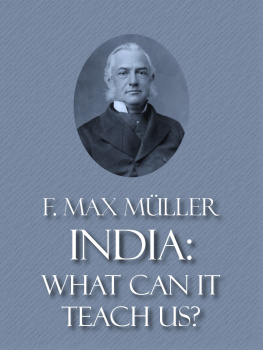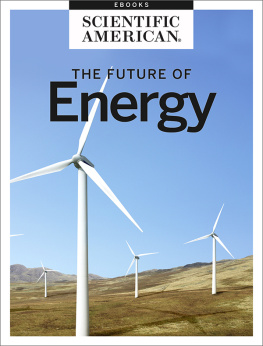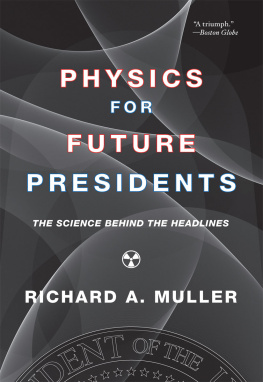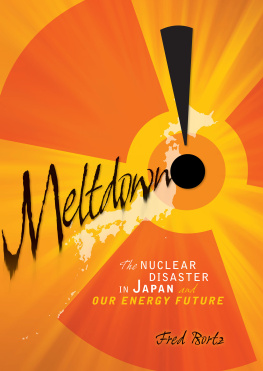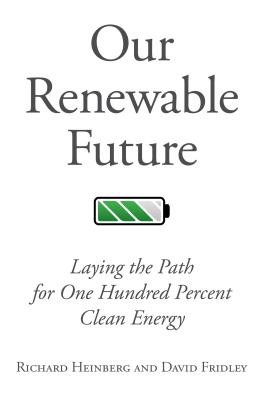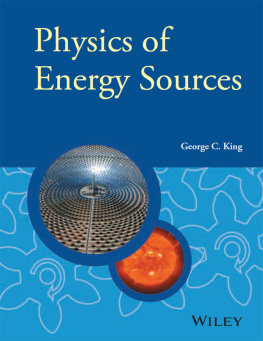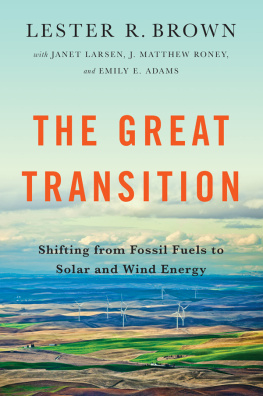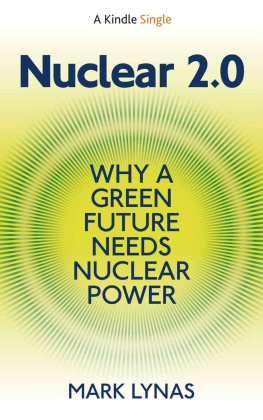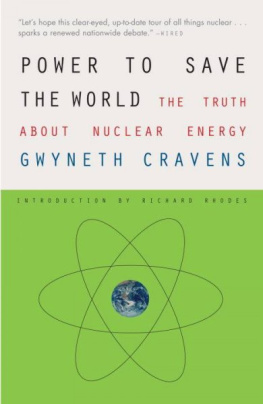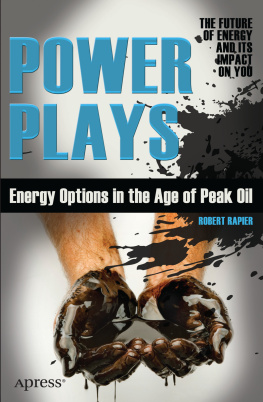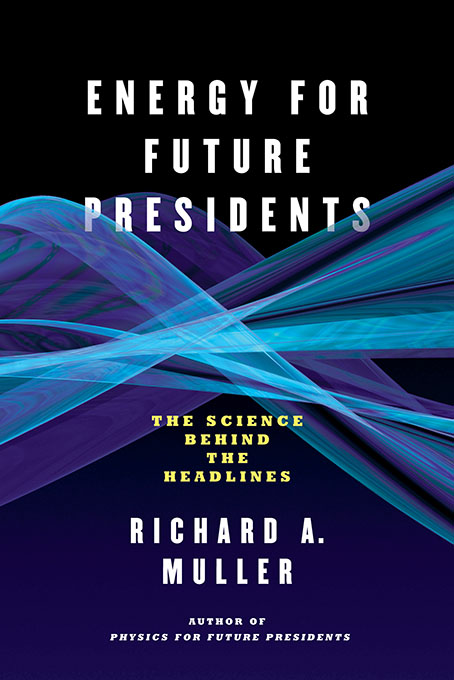
ENERGY
FOR
FUTURE
PRESIDENTS
T HE S CIENCE
BEHIND THE H EADLINES
RICHARD A.
MULLER

W. W. Norton & Company
New York London
to R OSEMARY
for encouraging me
to hike off-trail
C ONTENTS
A CKNOWLEDGMENTS
I AM GRATEFUL to several people for their helpful suggestions on an early draft of the manuscript, including Marlan Downey, Jonathan Katz, Jonathan Levine, and Dick Garwin. My foray into energy was inspired, in part, by similar forays by several friends, particularly Steve Koonin, Art Rosenfeld, Steve Chu, and Nate Lewis. It has been a great joy to work on energy technology and strategy with my daughter Elizabeth Muller, the cofounder of our Berkeley Earth Surface Temperature Project, and the CEO of our consulting company, Muller and Associates, on energy technology and strategy. I thank Stephanie Hiebert, my copy editor, for her patience and care. I am particularly grateful to Jack Repcheck both for inspiring me to write this book and for his invaluable guidance in both content and style.
P REFACE
The trouble with most folks isnt so much their ignorance; its known so many things that aint so.
Josh Billings, a nineteenth-century humorist
but often misattributed to Mark Twain
(thus making it a self-illustrating aphorism)
A FUTURE president must understand energy. You know that. And, as the introductory aphorism implies, it is equally important that you be aware of the misunderstandings of everyone else. When you are president, you will have the primary responsibility for gently correcting the mistakes of the people who need to be convinced. You will have to be the publics energy instructor.
There is a lot to understand. When you put politics temporarily aside and look at energy in an objective way, you reach conclusions that are often counterintuitive and unexpected. Following is a list of some of the results that Ill discuss in this book. Even if you dont find them surprising yourself, most of your constituents will.
The disasters of Fukushima and the Gulf oil spill were not nearly as catastrophic as many people think, and they should not imply any major change in energy policy.
Global warming, although real and caused largely by humans, can be controlled only if we find inexpensive or profitable methods to reduce greenhouse gas emissions in China and the developing world.
We have recently learned that we can exploit immense natural-gas reserves found in shale. Its not an exaggeration to call this discovery a windfall. Shale gas will play a central role in US energy policy over the next few decades.
The United States is running low not on fossil fuel, but only on transportation fuel. The keys to the future lie in synfuel (manufactured gasoline), natural gas, shale oil reserves, and improved automobile mileage.
Energy productivity can be improved enormously. Investments in efficiency and conservation can yield returns much better than those of Bernard Madoffs Ponzi scheme, and whats more, the returns are tax-free.
Solar energy is undergoing spectacular development, but its potential lies in solar cells, not in solar-thermal power plants. The main competitor to solar is natural gas.
Wind has significant potential as a supplemental source of electricity, but it requires a better power transmission grid. Now that wind power production is growing rapidly, there is growing opposition from environmentalists. The main competitor to wind is natural gas.
Energy storage (to address the intermittency of wind and solar) is a difficult and expensive problem. The most cost-effective approach is probably with batteries, although natural-gas backup might be cheaper.
Nuclear power is safe, and waste storage is not a difficult problem. Fears are driven by unfamiliarity and misinformation. The main competitor to nuclear power is natural gas.
The primary future value of biofuel will be for transportation energy security, not to prevent global warming. Corn ethanol should not be considered a biofuel. The main competitor to biofuel is natural gas.
Synfuels are practical and important and, when developed, should keep the cost of oil to $60 per barrel or less. For automobile fuel, synfuel manufactured from natural gas is one of the few energy sources that might beat out compressed natural gas.
There is a fast-breaking and potentially disruptive (in the good sense) new energy source: shale oil. The US reserves are enormous, and practical means of extraction have been developed. Shale oil appears to be cheaper to produce than synfuel, and it is likely to offer stiff competition to that industry.
The hydrogen economy is going nowhere. Some of the most romantic alternative-energy sources, including geothermal, tidal energy, and wave energy, also have no large-scale future.
Hybrid autos have a great future, but plug-in hybrids and all-electric automobiles do not; they cost much more to operate than do gasoline cars once you include battery replacement cost. There is an exception: autos that run on lead-acid batteries, with very short ranges (on the order of 4060 miles), could achieve widespread use in China, India, and the rest of the developing world.
Virtually none of the publicly proposed solutions to the danger of increased carbon dioxide, if implemented, have any realistic chance of working. Setting an example fails if the example is one that the developing world cant afford to follow. Perhaps the only workable solution is to encourage coal-to-shale-gas conversion in the developing world by vigorous sharing of US know-how.
These are all things that any future president needs to know. And they are all things that the future president will need to teach the public, to prevent energy policy from being driven by the publics known things that aint so.
I NTRODUCTION
E NERGY is the most important commodity in the world today. National wealth and energy use are strongly correlated. Countries go to war over energy. We are so sensitive to energy that disruption in a country that supplied only 2% of the worlds oil (Libya) triggered a 10% leap in oil prices.
Energy disasters follow one after the other. An enormous oil leak in the Gulf of Mexico threatened to become the greatest ecological disaster in US history. Nuclear accidents, despite optimistic predictions from nuclear supporters, just keep happeningThree Mile Island, Chernobyl, and then, when everything seemed safe again, Fukushima. Now theres a new energy threat: fracking, a natural-gas drilling method that can pollute entire watersheds. And excessive energy use may be leading us into the greatest catastrophe in human history: runaway global warming, accompanied by storms, floods, andironicallydroughts.
Much of our current economic distress derives from energy. Half of our $50 billion annual balance-of-trade deficit comes from oil importsand it could get worse. China competes with us for oil, and its oil imports are growing by 50% per year. That heavy reliance on oil puts an enormous stress on the market, particularly since we are predicted to hit (and pass) the oil peak in this decade. Many countries are threatened by energy insecurity. France and Germany discovered their vulnerability whensupposedly to teach Ukraine a lessonRussia cut off the supply pipelines for a day in 2009.
Despite these problems, we take energy for granted. When electric power to our home is disrupted, someone must be at fault! If prices rise, someone must be cheating! Access to cheap energy in the United States is a necessity, not a luxury. Many people treat it as a fundamental human right.
Next page


